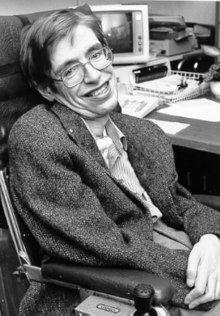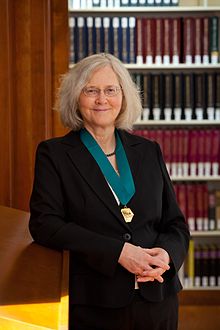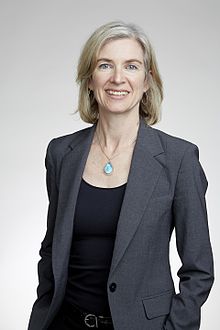Fellow of the Royal Society
Fellow of the Royal Society
Jump to navigation
Jump to search
| Fellowship of the Royal Society | |
|---|---|
 Headquarters of the Royal Society in Carlton House Terrace in London | |
| Awarded for | contributions to the improvement of natural knowledge”[1] |
| Sponsored by | Royal Society |
| Date | 1663 (1663) |
| Location | London |
| Country | United Kingdom |
| Total no. of Fellows | Approximately 8000 in total[2] with 1675 living right now[3] |
| Website | royalsociety.org/fellows |
Fellowship of the Royal Society (FRS, ForMemRS and HonFRS) is an award granted to individuals that the Royal Society of London judges to have made a 'substantial contribution to the improvement of natural knowledge, including mathematics, engineering science and medical science'.[1]

Isaac Newton was one of the earliest Fellows of the Royal Society, elected in 1672
Fellowship of the Society, the oldest scientific academy in continuous existence, is a significant honour which has been awarded to many eminent scientists from history including Isaac Newton (1672),[2]Charles Darwin (1839),[2]Michael Faraday (1824),[2]Ernest Rutherford (1903),[4]Srinivasa Ramanujan (1918),[5]Albert Einstein (1921),[6]Winston Churchill (1941), Subrahmanyan Chandrasekhar (1944),[7]Dorothy Hodgkin (1947),[8]Alan Turing (1951)[9] and Francis Crick (1959).[10][11] More recently, fellowship has been awarded to Stephen Hawking (1974), Tim Hunt (1991), Elizabeth Blackburn (1992), Tim Berners-Lee (2001), Venkatraman Ramakrishnan (2003), Atta-ur Rahman (2006),[12]Andre Geim (2007),[13]James Dyson (2015), Ajay Kumar Sood (2015), Subhash Khot (2017), Elon Musk (2018)[14] and around 8,000 others in total,[2] including over 280 Nobel Laureates since 1900. As of October 2018[update], there are approximately 1689 living Fellows, Foreign and Honorary Members, of which over 60 are Nobel Laureates.[3][15]
Fellowship of the Royal Society has been described by The Guardian newspaper as “the equivalent of a lifetime achievement Oscar”[16] with several institutions celebrating their announcement each year.[17][18][19][20][21][22][23]
Contents
1 Main Fellowships
1.1 Fellow of the Royal Society (FRS)
1.2 Foreign Member of the Royal Society (ForMemRS)
1.3 Honorary Fellow of the Royal Society (HonFRS)
1.4 Former Statute 12 Fellowships
1.5 Royal Fellows of the Royal Society
2 Election of new fellows
2.1 Nomination
2.2 Selection
2.3 Admission
3 Research Fellowships and other awards
4 References
Main Fellowships[edit]
Up to 60 new Fellows (FRS), honorary (HonFRS) and foreign members (ForMemRS) are elected annually in late April or early May, from a pool of around 700 proposed candidates each year.[24] New Fellows can only be nominated by existing Fellows for one of the fellowships described below:
Fellow of the Royal Society (FRS)[edit]

Stephen Hawking was elected a Fellow of the Royal Society in 1974[25]

Nobel laureate Elizabeth Blackburn was elected a Fellow of the Royal Society in 1992
Every year, up to 52 new Fellows are elected from the United Kingdom and the Commonwealth of Nations which make up around 90% of the society.[1] Each candidate is considered on their merits and can be proposed from any sector of the scientific community. Fellows are elected for life on the basis of excellence in science and are entitled to use the post-nominal letters FRS.[1] See Category:Fellows of the Royal Society and Category:Female Fellows of the Royal Society.
Foreign Member of the Royal Society (ForMemRS)[edit]

Jennifer Doudna, a professor of chemistry, was elected a Foreign Member of the Royal Society (ForMemRS) in 2016
Every year, Fellows elect up to ten new Foreign Members. Like Fellows, Foreign Members are elected for life through peer review on the basis of excellence in science. As of 2016[update] there are around 165 Foreign Members, who are entitled to use the post-nominal ForMemRS.[26] See Category:Foreign Members of the Royal Society.
Honorary Fellow of the Royal Society (HonFRS)[edit]

Bill Bryson was elected an Honorary Member of the Royal Society in 2013
Honorary Fellowship is an honorary academic title awarded to candidates who have given distinguished service to the cause of science, but do not have the kind of scientific achievements required of Fellows or Foreign Members. Honorary Fellows include Bill Bryson (2013), Melvyn Bragg (2010), Robin Saxby (2015), David Sainsbury, Baron Sainsbury of Turville (2008) and Onora O'Neill (2007). Honorary Fellows are entitled to use the post nominal letters FRS.[27] Others including John Maddox (2000),[28]Patrick Moore (2001) and Lisa Jardine (2015)[29][30] were elected as honorary fellows, see Category:Honorary Fellows of the Royal Society.
Former Statute 12 Fellowships[edit]

David Attenborough was elected a Fellow of the Royal Society in 1983 under former statute 12
Statute 12 is a legacy mechanism for electing members before official honorary membership existed in 1997.[citation needed] Fellows elected under statute 12 include David Attenborough (1983) and John Palmer, 4th Earl of Selborne (1991). Prime Ministers of the United Kingdom such as Margaret Thatcher (1983),[2]Neville Chamberlain (1938),[2]H. H. Asquith (1908)[2] were elected under statute 12, see Category:Fellows of the Royal Society (Statute 12).
Royal Fellows of the Royal Society[edit]
The Council of the Royal Society can recommend members of the British Royal Family for election as Royal Fellows of the Royal Society. As of 2016[update] there are five royal fellows: Charles, Prince of Wales (1978),[31]Anne, Princess Royal (1987),[32]Prince Edward, Duke of Kent (1990),[33]Prince William, Duke of Cambridge (2009)[34] and Prince Andrew, Duke of York (2013).[35] Her Majesty the Queen, Elizabeth II is not a Royal Fellow, but provides her patronage to the Society as all reigning British monarchs have done since Charles II of England. Prince Philip, Duke of Edinburgh (1951) was elected under statute 12, not as a Royal Fellow.[36]
Election of new fellows[edit]
The election of new fellows is announced annually in May, after their nomination and a period of peer-reviewed selection.[1]
Nomination[edit]
Each candidate for Fellowship or Foreign Membership is nominated by two Fellows of the Royal Society (a proposer and a seconder), who sign a certificate of proposal.[37] Previously, nominations required at least five fellows to support each nomination by the proposer,[37] which was criticised for supposedly establishing an old-boy network and elitist gentlemen's club.[38][39][40] The certificate of election (see for example[41]) includes a statement of the principal grounds on which the proposal is being made. There is no limit on the number of nominations made each year. In 2015, there were 654 candidates for election as Fellows and 106 candidates for Foreign Membership.[1]
Selection[edit]
The Council of the Royal Society oversees the selection process and appoints 10 subject area committees, known as Sectional Committees,[15] to recommend the strongest candidates for election to Fellowship. The final list of up to 52 Fellowship candidates and up to 10 Foreign Membership candidates is confirmed by the Council in April and a secret ballot of Fellows is held at a meeting in May. A candidate is elected if he or she secures two-thirds of votes of those Fellows present and voting.
A maximum of 18 Fellowships can be allocated to candidates from Physical Sciences and Biological Sciences; and up to 10 from Applied Sciences, Human Sciences and Joint Physical and Biological Sciences. A further maximum of 6 can be ‘Honorary’, ‘General’ or ‘Royal’ Fellows. Nominations for Fellowship are peer reviewed by sectional committees, each with 15 members and a chair. Members of the 10 sectional committees change every 3 years to mitigate in-group bias,[37] each group covers different specialist areas including:
- Mathematics
Astronomy and physics- Chemistry
- Engineering
Earth science and environmental science
Biochemistry and molecular cell biology
Microbiology, immunology and developmental biology
Anatomy, physiology and neuroscience
Organismal biology, evolution and ecology- Health and human sciences[42]
Admission[edit]
New Fellows are admitted to the Society at a formal admissions day ceremony held annually in July,[43] when they sign the Charter Book and the Obligation which reads:
"We who have hereunto subscribed, do hereby promise, that we will endeavour to promote the good of the Royal Society of London for Improving Natural Knowledge, and to pursue the ends for which the same was founded; that we will carry out, as far as we are able, those actions requested of us in the name of the Council; and that we will observe the Statutes and Standing Orders of the said Society. Provided that, whensoever any of us shall signify to the President under our hands, that we desire to withdraw from the Society, we shall be free from this Obligation for the future".[1]
Since 2014, portraits of Fellows at the admissions ceremony have been published without copyright restrictions in Wikimedia Commons under a more permissive Creative Commons license which allows wider re-use.[44][45]
Research Fellowships and other awards[edit]

Brian Cox, a professor of physics, was elected a Fellow of the Royal Society in 2016 having previously held a Royal Society University Research Fellowship (URF) from 2005 to 2013[46]
In addition to the main Fellowships of the Royal Society (FRS, ForMemRS & HonFRS), other fellowships are available which are applied for by individuals, rather than through election. Holders of these fellowships are known as Royal Society Research Fellows.[47]
University Research Fellowships (URFs) Royal Society University Research Fellowships are for outstanding scientists in the UK who are in the early stages of their research career and have the potential to become leaders in their field.[48] Previous holders of URFs have been elected FRS at a later date including Richard Borcherds (1994), Jean Beggs (1998), Frances Ashcroft (1999), Athene Donald (1999) and John Pethica (1999).[49] More recent awardees include Terri Attwood, Sarah-Jayne Blakemore, Brian Cox, Sarah Bridle, Shahn Majid, Tanya Monro, Beth Shapiro, David J. Wales and Kathy Willis
Royal Society Leverhulme Trust Senior Research Fellowships are for scientists who would benefit from a period of full-time research without teaching and administrative duties, supported by the Leverhulme Trust.[50]
Newton Advanced Fellowships provide established international researchers with an opportunity to develop the research strengths and capabilities of their research group. Provided by the Newton Fund via the official development assistance[51]
Industry Fellowships are for academic scientists who want to work on a collaborative project with industry and for scientists in industry who want to work on a collaborative project with an academic organisation.[52]
Dorothy Hodgkin Fellowships are for outstanding scientists in the UK at an early stage of their research career who require a flexible working pattern due to personal circumstances. These fellowships are named after Dorothy Hodgkin.[53]
In addition to the award of Fellowship (FRS, HonFRS & ForMemRS) and the Research Fellowships described above, several other awards, lectures and medals of the Royal Society are also given.
References[edit]
^ abcdefg Anon (2015). "Royal Society Elections". London: Royal Society. Archived from the original on 2015-09-06..mw-parser-output cite.citationfont-style:inherit.mw-parser-output qquotes:"""""""'""'".mw-parser-output code.cs1-codecolor:inherit;background:inherit;border:inherit;padding:inherit.mw-parser-output .cs1-lock-free abackground:url("//upload.wikimedia.org/wikipedia/commons/thumb/6/65/Lock-green.svg/9px-Lock-green.svg.png")no-repeat;background-position:right .1em center.mw-parser-output .cs1-lock-limited a,.mw-parser-output .cs1-lock-registration abackground:url("//upload.wikimedia.org/wikipedia/commons/thumb/d/d6/Lock-gray-alt-2.svg/9px-Lock-gray-alt-2.svg.png")no-repeat;background-position:right .1em center.mw-parser-output .cs1-lock-subscription abackground:url("//upload.wikimedia.org/wikipedia/commons/thumb/a/aa/Lock-red-alt-2.svg/9px-Lock-red-alt-2.svg.png")no-repeat;background-position:right .1em center.mw-parser-output .cs1-subscription,.mw-parser-output .cs1-registrationcolor:#555.mw-parser-output .cs1-subscription span,.mw-parser-output .cs1-registration spanborder-bottom:1px dotted;cursor:help.mw-parser-output .cs1-hidden-errordisplay:none;font-size:100%.mw-parser-output .cs1-visible-errorfont-size:100%.mw-parser-output .cs1-subscription,.mw-parser-output .cs1-registration,.mw-parser-output .cs1-formatfont-size:95%.mw-parser-output .cs1-kern-left,.mw-parser-output .cs1-kern-wl-leftpadding-left:0.2em.mw-parser-output .cs1-kern-right,.mw-parser-output .cs1-kern-wl-rightpadding-right:0.2em
^ abcdefgh Anon (2015). "Fellowship of the Royal Society 1660-2015". London: Royal Society. Archived from the original on 2015-07-15.
^ ab "Fellows Directory - Royal Society". Royalsociety.org. Retrieved 23 August 2018.
^ Eve, A. S.; Chadwick, J. (1938). "Lord Rutherford 1871–1937". Obituary Notices of Fellows of the Royal Society. 2 (6): 394–423. doi:10.1098/rsbm.1938.0025.
^ Neville, Eric Harold (1921). "The Late Srinivasa Ramanujan". Nature. 106 (2673): 661–662. Bibcode:1921Natur.106..661N. doi:10.1038/106661b0.
^ Whittaker, E. (1955). "Albert Einstein. 1879–1955". Biographical Memoirs of Fellows of the Royal Society. 1: 37–67. doi:10.1098/rsbm.1955.0005. JSTOR 769242.
^ Tayler, Roger J. (1996). "Subrahmanyan Chandrasekhar. 19 October 1910 – 21 August 1995". Biographical Memoirs of Fellows of the Royal Society. 42: 80–94. doi:10.1098/rsbm.1996.0006.
^ Dodson, Guy (2002). "Dorothy Mary Crowfoot Hodgkin, O.M. 12 May 1910 - 29 July 1994". Biographical Memoirs of Fellows of the Royal Society. 48 (0): 179–219. doi:10.1098/rsbm.2002.0011.
^ Newman, M. H. A. (1955). "Alan Mathison Turing. 1912–1954". Biographical Memoirs of Fellows of the Royal Society. 1: 253–263. doi:10.1098/rsbm.1955.0019. JSTOR 769256.
^ Bretscher, Mark S.; Mitchison, Graeme (2017). "Francis Harry Compton Crick OM. 8 June 1916 — 28 July 2004". Biographical Memoirs of Fellows of the Royal Society: rsbm20170010. doi:10.1098/rsbm.2017.0010. ISSN 0080-4606.
^ Rich, Alexander; Stevens, Charles F. (2004). "Obituary: Francis Crick (1916–2004)". Nature. 430 (7002): 845–847. Bibcode:2004Natur.430..845R. doi:10.1038/430845a. PMID 15318208.
^ "Atta-Ur Rahman - Royal Society". Royalsociety.org. Retrieved 23 August 2018.
^ "Andre Geim - Royal Society". Royalsociety.org. Retrieved 23 August 2018.
^ "Elon Musk - Royal Society". Royalsociety.org. Retrieved 23 August 2018.
^ ab Anon (2007). "Fellowship of the Royal Society: a window on the election process" (PDF). Archived from the original (PDF) on 2016-04-05.
^ Blackstock, Colin (2004). "Fellows keep Susan Greenfield off Royal Society list". London: The Guardian. Archived from the original on 2015-09-13.
^ Anon (2016). "Eminent cancer researchers elected to Royal Society Fellowship". London: Institute of Cancer Research. Archived from the original on 2016-05-25.
^ Anon (2016). "Royal Society Fellowship for Crick scientist". London: Francis Crick Institute. Archived from the original on 2016-05-25.
^ Anon (2016). "Manchester scientists elected as Fellows of Royal Society". Manchester.ac.uk. Manchester: University of Manchester. Archived from the original on 2016-05-07.
^ Anon (2016). "Royal Society Fellows at Imperial College". London: Imperial College London. Archived from the original on 2016-04-15.
^ Anon (2016). "Three University of Aberdeen researchers elected to Royal Society". Aberdeen: University of Aberdeen. Archived from the original on 2016-05-25.
^ Anon (2016). "Five Cambridge University academics join the Royal Society". Cambridge: University of Cambridge. Archived from the original on 2016-04-24.
^ Anon (2016). "Seven Oxford academics elected Fellows of the Royal Society". Oxford: University of Oxford. Archived from the original on 2016-04-30.
^ Keeler, C. Richard (2011). "Three Hundred Fifty Years of the Royal Society". Archives of Ophthalmology. 129 (10): 1361–5. doi:10.1001/archophthalmol.2011.222. PMID 21987680.
^ "Stephen Hawking - Royal Society". Royalsociety.org. Retrieved 23 August 2018.
^ Gulyas, Balázs; Somogyi, Peter (2012). "János Szentágothai 31 October 1912 - 8 September 1994: Elected ForMemRs 20 April 1978". Biographical Memoirs of Fellows of the Royal Society. 59 (0): 383–406. doi:10.1098/rsbm.2012.0038. PMC 4477047. PMID 26113752.
^ "Fellows Directory".
^ Gratzer, Walter (2010). "Sir John Royden Maddox. 27 November 1925 -- 12 April 2009". Biographical Memoirs of Fellows of the Royal Society. 56: 237–255. doi:10.1098/rsbm.2009.0024.
^ Hunter, Michael (2017). "Lisa Jardine CBE. 12 April 1944 — 25 October 2015". Biographical Memoirs of Fellows of the Royal Society: rsbm20170015. doi:10.1098/rsbm.2017.0015. ISSN 0080-4606.
^ Grafton, Anthony (2015). "Lisa Jardine (1944–2015)". Nature. 528 (7580): 40. Bibcode:2015Natur.528...40G. doi:10.1038/528040a. PMID 26632582.
^ Anon (1978). "His Royal Highness The Prince of Wales KG KT GCB OM FRS Royal Fellow". London: Royal Society. Archived from the original on 2015-11-17.
^ Anon (1987). "Her Royal Highness The Princess Royal Princess Anne KG KT GCVO GCStJ QSO GCL FRS Royal Fellow". London: Royal Society. Archived from the original on 2015-11-17.
^ Anon (1990). "His Royal Highness Prince Edward, Duke of Kent KG GCMG GCVO ADC(P) FRS Royal Fellow". London: Royal Society. Archived from the original on 2015-11-17.
^ Anon (2009). "His Royal Highness Prince William, Duke of Cambridge KG KT ADC(P) FRS Royal Fellow". London: Royal Society. Archived from the original on 2015-11-17.
^ Anon (2013). "His Royal Highness Prince Andrew, Duke of York KG GCVO FRS Royal Fellow". London: Royal Society. Archived from the original on 2015-11-17.
^ Anon (1951). "His Royal Highness Prince Philip, Duke of Edinburgh KG Kt OM GBE FRS Statute 12". London: Royal Society. Archived from the original on 2015-11-24.
^ abc Athene Donald (2012-04-20). "Ten Things You Should Know about Election to the Royal Society". Occam's Typewriter. Archived from the original on 2014-08-24.
^ Gallagher, Paul (2013). "Sparks fly over Royal Society gender study". Independent.co.uk. The Independent. Archived from the original on 2013-07-03.
^ Gallagher, Paul (2002). "A bunch of jolly-good fellows or old cronies who don't deserve £25m a year?". Times Higher Education. Archived from the original on 2014-12-30.
^ Connor, Steve (2002). "Royal societies not recruiting enough women, say MPs". The Independent. Archived from the original on 2016-05-25.
^ "Certificate of Election and candidature: EC/2007/16: Andre Geim". London: Royal Society. Archived from the original on 11 July 2015.
^ "Membership of Sectional Committees 2015" (PDF). Archived from the original (PDF) on 2015-05-05.
^ McManus, Jo (2010). "Royal Society Admissions Day: photographing new Fellows". Archived from the original on 2015-04-14.
^ "Images released by the Royal Society". Wikimedia Commons.
^ Byrne, John (2014). "New images released are quickly put to use". Wikimedia Foundation. Archived from the original on 2014-10-21.
^ Anon (2016). "Professor Brian Cox OBE FRS". Royalsociety.org. London: Royal Society. Archived from the original on 29 April 2016.
^ "Research Fellows directory". Archived from the original on 2016-05-03.
^ "University Research Fellowship: for outstanding scientists in the UK". Royal Society. Archived from the original on 2016-02-03.
^ Cook, Alan (2000). "URFs become FRS: Frances Ashcroft, Athene Donald and John Pethica". Notes and Records of the Royal Society. 54 (3): 409–411. doi:10.1098/rsnr.2000.0181.
^ "Royal Society Leverhulme Trust Senior Research Fellowship". Royal Society. Archived from the original on 2016-01-18.
^ "Newton Advanced Fellowships". London: Royal Society. Archived from the original on 2016-05-15.
^ "Industry Fellowships". royalsociety.org. Archived from the original on 2016-04-10.
^ "Dorothy Hodgkin Fellowship". London: royalsociety.org. Archived from the original on 2015-09-06.
Categories:
- Academic awards
- British awards
- Fellowships
- Royal Society
(window.RLQ=window.RLQ||).push(function()mw.config.set("wgPageParseReport":"limitreport":"cputime":"0.760","walltime":"0.919","ppvisitednodes":"value":3756,"limit":1000000,"ppgeneratednodes":"value":0,"limit":1500000,"postexpandincludesize":"value":157202,"limit":2097152,"templateargumentsize":"value":2804,"limit":2097152,"expansiondepth":"value":20,"limit":40,"expensivefunctioncount":"value":10,"limit":500,"unstrip-depth":"value":1,"limit":20,"unstrip-size":"value":148349,"limit":5000000,"entityaccesscount":"value":6,"limit":400,"timingprofile":["100.00% 770.585 1 -total"," 55.34% 426.464 1 Template:Reflist"," 28.91% 222.805 39 Template:Cite_web"," 18.99% 146.370 1 Template:Infobox_award"," 16.90% 130.227 14 Template:Cite_journal"," 16.67% 128.451 1 Template:Infobox"," 6.62% 51.028 1 Template:Citation_needed"," 6.19% 47.711 1 Template:Fix"," 4.37% 33.646 2 Template:Category_handler"," 4.27% 32.921 1 Template:Use_dmy_dates"],"scribunto":"limitreport-timeusage":"value":"0.410","limit":"10.000","limitreport-memusage":"value":8329412,"limit":52428800,"cachereport":"origin":"mw1287","timestamp":"20190108142935","ttl":1900800,"transientcontent":false);mw.config.set("wgBackendResponseTime":95,"wgHostname":"mw1323"););

